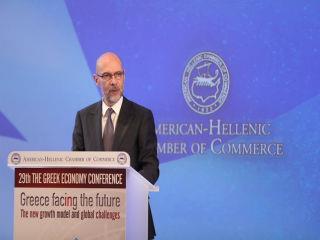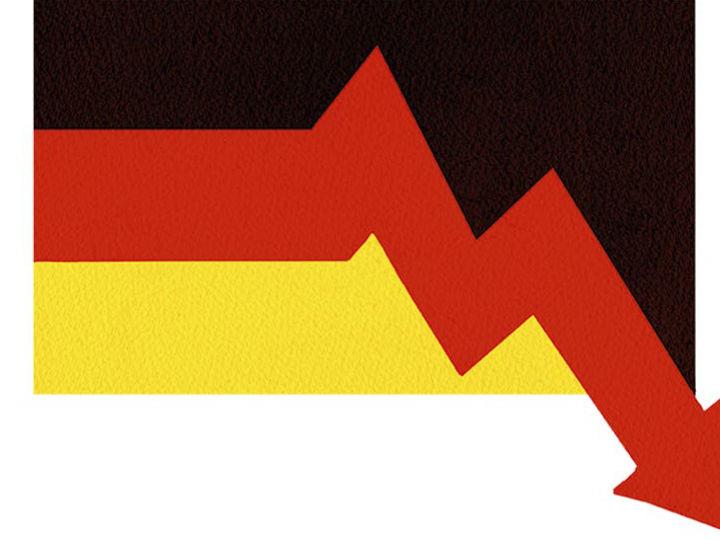AmCham President: “We are now better prepared to deal with a new financial crisis”
On the occasion of the “29th The Greek Economy Conference” held in Athens, the President of the American Hellenic Chamber of Commerce, Mr. Simos Anastasopoulos, gave an exclusive interview at the European Business Review

The world is facing many challenges including global debt, trade wars, banking and financial systems and Eurozone problems not to mention major upcoming disruptions like the 4th industrial revolution and the digital world. Although debt levels have risen again to new highs and global growth is slowing, the banks are now better capitalized and regulated to face new challenges
By
Alexandra Papaisidorou*
On the occasion of the “29th The Greek Economy Conference” held in Athens, the President of the American Hellenic Chamber of Commerce, Mr. Simos Anastasopoulos, gave an exclusive interview at the European Business Review. The President referred among other things to the sectors of the Greek economy with the greatest investment interest, the role of the Chamber and the global challenges ahead.
Simos Anastasopoulos has been at the helm of the American-Hellenic Chamber of Commerce since 2013 and has led many pro-business and investment initiatives in his time as President.
The cherry on top was this year’s TIF with honored country the US and the prestigious American Pavilion under the auspices of the American - Hellenic Chamber.
European Business Review (EBR): This year TIF showed effectively the interest of America in Greek economy. Which factors have been contributed tο this attitude, do you consider? Which sectors were of the greatest investment interest?
Simos Anastasopoulos (SA): The American Pavilion in TIF 2018, featuring the US as the honored country, was a landmark event. Not only because of the presence of more than 60 technology and innovation heavyweights but mainly because of the 75 events that took place within the Pavilion and brought together the Greek SMEs and startups with the American conglomerates.
The American interest was manifested also by the presence of a government delegation led by US Secretary of Commerce Wilbur Ross and senior members of the administration.
With the end of the bailout period, Greece’s profile has been upgraded and duly appreciated by the US administration as well as the business community. TIF was a great opportunity for the US to announce its presence and interest for collaboration in Southeastern Europe where Greece is emerging as a center of economic, business and technological interest.
During numerous discussions and negotiations, the American interest for the Energy, Tourism, Defense and Security sectors was made quite evident. Following the privatization of the Thessaloniki Port and the upgrade of transportation routes to Central and Northern Europe logistics appeared also very high in the list of potential investors
European Business Review (EBR): The American-Hellenic Chamber certainly played the most important role to the successful outcome of TIF with the collaboration of Greece and US. Which are the Chamber’s plans from now on in order to give value of the occurring momentum with the best possible way?
Simos Anastasopoulos (SA): We take pride in organizing the American Pavilion in the most successful TIF to date and we intend to follow up on the positive momentum in order to increase our presence in US, promote the economic developments and the significant opportunities that can attract further investment interest and assist reinforcing Greece’s role as the commercial center in SE Europe and a pillar of stability in the region.
European Business Review (EBR): The end of this year signifies the ten-year period since the beginning of the financial crisis burst out with the breakdown of Lehman Brothers. Do you believe that the global economy is ready to deal with a new equivalent crisis, if and whenever it arises? What has & hasn't changed since then?
Simos Anastasopoulos (SA): The world is facing many challenges including global debt, trade wars, banking and financial systems and Eurozone problems not to mention major upcoming disruptions like the 4th industrial revolution and the digital world. Although debt levels have risen again to new highs and global growth is slowing, the banks are now better capitalized and regulated to face new challenges.
The European and federal authorities have proven to react effectively, even if with some delay in Europe’s case, to respond to critical situations, sustain growth and contain any difficult financial situation. Greece is such a case where, even unprepared, the Eurosystem managed to contain a crisis that threatened not only the Euro but Eurozone and the Common Market. With the experience obtained and the political will as has repeatedly been expressed, we are definitely better prepared to deal with a new equivalent crisis (black swans included?).
*Editor-at-large & PhD candidate of European & International Relations



 By: N. Peter Kramer
By: N. Peter Kramer

